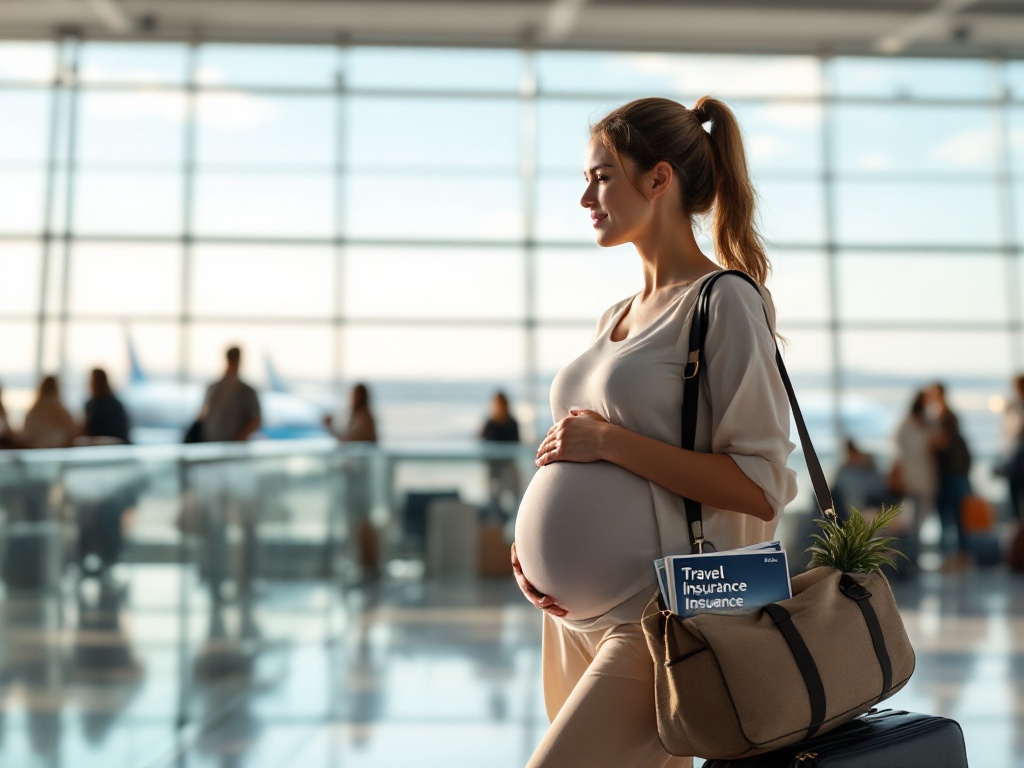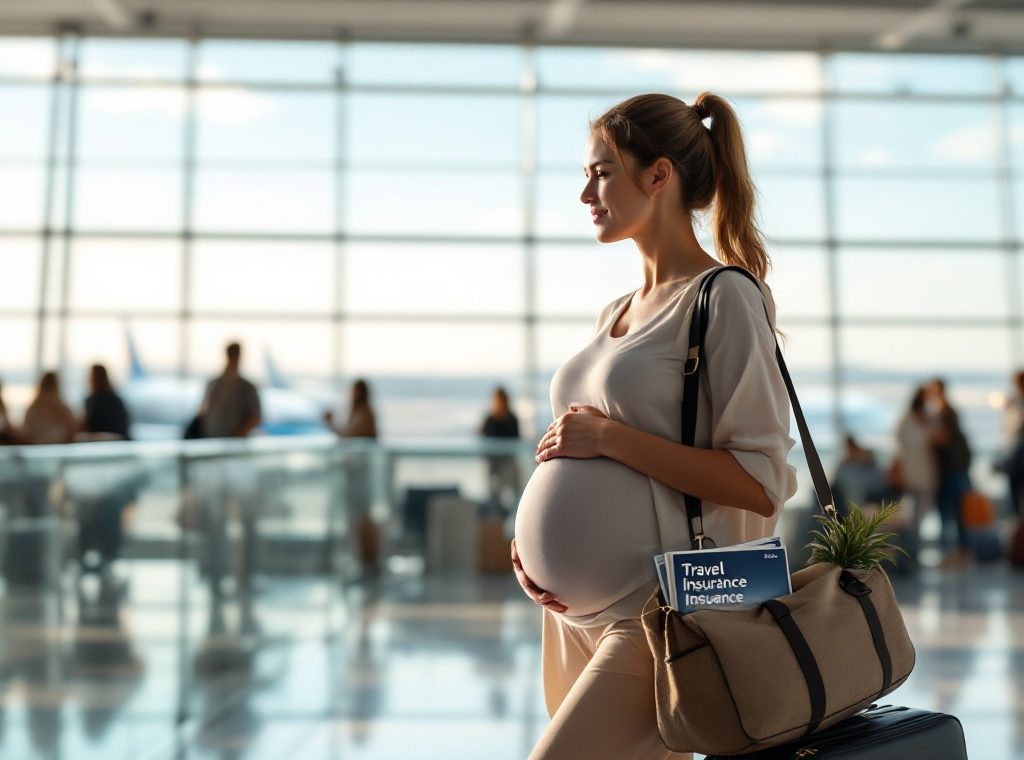Health and Safety: Essential Tips for Traveling Pregnant Abroad
Planning a trip during pregnancy? Discover crucial safety advice for a smooth and healthy journey. Learn the safest trimester for travel, essential precautions for air and car travel, and how to manage potential health risks. Explore vital information on food and drink safety, necessary vaccinations, and the importance of travel insurance. Empower yourself with the knowledge to make informed decisions and ensure a worry-free travel experience. Read on to start planning your safe pregnancy travels!
Important information

- The second trimester (14-28 weeks) is generally the safest and most comfortable time to travel during pregnancy.
- Consult your doctor before any travel, especially if you have a high-risk pregnancy or pre-existing conditions.
- Check your airline’s specific travel policies regarding pregnancy, as many restrict travel after 36 weeks.
- Prevent blood clots during travel by wearing compression socks, taking regular walks, and staying hydrated.
- Ensure food and water safety by consuming bottled or boiled water, eating thoroughly cooked meals, and practicing diligent handwashing.
When is it Safe to Travel During Pregnancy?
The second trimester (weeks 14-28) is often the most comfortable time for travel during pregnancy. While the first trimester can be challenging due to morning sickness and fatigue, the second offers a reprieve. However, as the due date nears in the third trimester, the risk of premature labor increases. Women with uncomplicated pregnancies can often travel safely until closer to their due date. Those with high-risk pregnancies should generally avoid travel. Consulting your doctor about travel plans is crucial for personalized guidance.
Understanding Low-Risk and High-Risk Pregnancies
Traveling is generally safe during a low-risk pregnancy. However, if your pregnancy is high-risk, potential complications could restrict your travel. Consulting your doctor before any trip is essential, particularly if you have pre-existing conditions like high blood pressure, which can make travel more dangerous. Should complications develop during your pregnancy, your doctor might recommend against travel to protect both your health and your baby’s.
Consulting Your Obstetric Healthcare Provider
Discuss your travel plans with your obstetrician so they can assess any potential risks related to your pregnancy and its stage. They can also advise you on necessary vaccinations and medications for your trip.
Airlines’ Travel Restrictions and Guidelines
Traveling during pregnancy requires careful planning. Many airlines restrict travel after 36 weeks of pregnancy, so it’s crucial to check your airline’s specific policies. A doctor’s note may be required for travel, especially during the later stages of pregnancy.
Precautions for Pregnant Travelers
Consult your doctor before traveling during pregnancy to assess potential risks specific to your situation.
Pack comfortable clothing, snacks, and medication for nausea.
Bring a reusable water bottle to stay hydrated.
Wear compression socks during air travel to improve circulation and reduce swelling.
Avoid risky activities like scuba diving and contact sports.
Ensure your travel insurance covers pregnancy-related complications.
Carry essential medical documents, including immunization records.
Research safe food and drink options at your destination.
Review the airline’s policies for pregnant passengers if flying.
Take frequent breaks for walking and stretching during long car rides.
Recommended Vaccinations and Infectious Disease Prevention
Consult your doctor about safe vaccinations during pregnancy. They often recommend the flu shot and Tdap, while live virus vaccines should be avoided. Some vaccines, like Hepatitis A and typhoid, are recommended depending on your destination, so discuss your travel plans with your physician. Consider the inherent risks of international travel, especially to developing nations, which is often discouraged during pregnancy due to potential disease exposure and varying medical standards. Your doctor can provide personalized advice to help you make informed decisions about travel and necessary vaccinations.
Safe Travel Practices and Avoiding Unsafe Activities
Pregnancy requires extra care for both mother and baby. Avoid risky activities such as horseback riding, scuba diving, and contact sports. Food safety is crucial. Always consume thoroughly cooked foods, avoiding raw or undercooked options, unpasteurized dairy, and deli meats. This helps prevent foodborne illnesses that could harm the baby. Opt for bottled water and avoid ice cubes from tap water to stay hydrated safely.
Essential Comfort Items: Clothing, Snacks, and Anti-nausea Medicines
For a comfortable journey, pack loose clothing, snacks, and water.
Don’t forget anti-nausea medication if you’re prone to motion sickness.
A snug seatbelt, positioned low across your hips, is essential for both comfort and safety.
Traveling by Different Modes of Transport
Traveling While Pregnant: Tips for a Smooth Journey
Air Travel
- Always buckle up, for your safety and the baby’s.
- Choose an aisle seat. This allows for easy access to the restroom and facilitates regular movement.
- Walk around the cabin every hour to improve circulation and reduce stiffness.
Car Travel
- Take frequent breaks. Stop every hour or two to stretch your legs and adjust your seating position.
- Find a comfortable position. Avoid putting pressure on your abdomen.
- Always wear your seatbelt. Position the lap belt below your belly for optimal safety.
Guidelines for Air Travel During Pregnancy
Planning air travel during pregnancy requires some extra considerations for a comfortable and safe journey. Choosing an aisle seat allows for easier movement and convenient restroom access. Always remember to buckle up for safety, even during pregnancy.Airlines often have specific restrictions regarding flying during the later stages of pregnancy. Checking your airline’s policy beforehand will ensure a smoother trip. During the flight, take short walks every 30 minutes to improve circulation and reduce the risk of blood clots.Staying hydrated and wearing comfortable clothing will significantly contribute to a more pleasant flight experience. Most importantly, consult your doctor before flying while pregnant to ensure both your safety and well-being. For added protection, consider wearing a mask during your travels.
Safety Tips for Long Car Journeys
For long car trips, break every hour or two for a walk to improve circulation and prevent blood clots.
Staying well-hydrated with plenty of water is crucial for both your and your baby’s health.
Ensure a comfortable seat and dress in layers to maintain a comfortable temperature.
Managing Health Risks While Traveling
A healthy pregnancy while traveling requires key preparations. Preventing blood clots, especially deep vein thrombosis (DVT), is paramount. Maintaining a balanced diet and staying well-hydrated are crucial for both your and your baby’s well-being. Be prepared for potential complications and know how to handle medical emergencies.
Consult your doctor before embarking on your trip. They can provide personalized advice and recommend precautions based on your specific needs and destination.
Discuss potential complications with your doctor. Establish a plan for accessing medical care in case of an emergency.
Carry your medical records and emergency contact information with you at all times. This will be crucial in case of any unforeseen events.
Addressing any concerns beforehand with your physician will contribute to a safer and healthier journey.
Preventing Deep Vein Thrombosis (DVT) and Blood Clots
Staying active during travel is vital for preventing Deep Vein Thrombosis (DVT), a serious blood clot that typically forms in the leg. Regularly moving your legs and feet, ideally every 30 minutes, promotes healthy circulation and reduces your risk. Wearing compression stockings can further enhance blood flow in your legs. Short walks, whether down the airplane aisle or during a roadside stop on a car trip, offer significant protection against DVT.
Move your legs and feet regularly. Aim for movement every 30 minutes to promote circulation.
Wear compression stockings. These stockings enhance blood flow in your legs, further reducing DVT risk.
Take short walks. Even brief walks down the airplane aisle or during roadside stops offer significant protection.
Hydration and Healthy Diet During Travel
Staying well-hydrated is crucial for a healthy pregnancy, especially when traveling. Dehydration can lead to complications, so drink plenty of water throughout your trip. Pack nutritious snacks like fruits, vegetables, and nuts for sustained energy. Opt for bottled water over tap water and avoid ice cubes and unpasteurized drinks as they may harbor harmful bacteria. Ensure your meals are thoroughly cooked, especially meat, seafood, and eggs, to minimize the risk of foodborne illnesses. A reusable water bottle is a great idea; refill it with bottled water whenever possible. Choose reputable restaurants with good hygiene practices to ensure safe food and water sources.
Stay Hydrated: Drink plenty of water throughout your trip to avoid dehydration and potential complications.
Pack Nutritious Snacks: Bring fruits, vegetables, and nuts for sustained energy.
Choose Safe Water: Opt for bottled water and avoid tap water, ice cubes, and unpasteurized drinks.
Ensure Thoroughly Cooked Meals: Pay extra attention to meat, seafood, and eggs to minimize foodborne illness risks.
Reusable Water Bottle: Carry a reusable water bottle and refill it with bottled water.
Safe Food and Water Sources: Prioritize reputable restaurants with good hygiene practices.
Handling Pregnancy Complications and Medical Emergencies
Traveling during pregnancy, especially with complications, can be risky and is generally not recommended. If a medical emergency occurs while traveling, seek immediate care at the nearest medical facility. Before your trip, research available healthcare options at your destination to ensure a safe and healthy journey.
Travel Insurance and Medical Care
Traveling while pregnant? Ensure a safe and worry-free trip by prioritizing travel health insurance and medical evacuation coverage. These policies offer vital financial protection for pregnancy-related medical emergencies, including labor and delivery. Before embarking on your journey, thoroughly review your policy, focusing on pre-existing condition coverage and ensuring adequate coverage limits for your destination.
Healthcare Access
Research hospitals and clinics near your destination, verifying their capacity to handle pregnancy-related emergencies. Understand the local medical system, noting any language barriers or service limitations. Consider locating a local obstetrician for potential complications.
Essential Documents
Maintain accessible copies of your maternity and immunization records, including prenatal care information. These documents facilitate prompt understanding of your medical history by local healthcare providers, proving invaluable during emergencies.
Importance of Travel Health Insurance and Medical Evacuation Insurance
Traveling while pregnant requires careful planning, especially regarding health coverage. Travel health insurance is crucial, as it covers potential emergencies like premature labor or other pregnancy-related complications. For international trips, medical evacuation insurance becomes even more vital. This type of coverage ensures transport to suitable medical facilities, which is especially important in regions where specialized care might be limited. Before your trip, thoroughly review your policy details. Confirm that the coverage aligns with your specific needs and destination, paying close attention to any exclusions or variations in coverage amounts.
Accessing Medical Facilities and Urgent Medical Attention Abroad
Planning a trip abroad during pregnancy requires careful preparation. Before you depart, research healthcare options at your destination, including hospitals, clinics, and international assistance services. Identifying an obstetrician or healthcare provider in advance is essential for a smooth trip.Remember to pack crucial documents such as your maternity medical records, insurance information, and emergency contact details. Familiarize yourself with the local medical system, including language barriers and specific procedures, as protocols can differ significantly between countries.In case of an emergency, contact local emergency services or your embassy/consulate for immediate assistance. Thorough preparation will contribute to a safer, healthier, and more relaxing journey.
Keeping Maternity Medical Records and Immunization Records Handy
Traveling abroad while pregnant requires careful preparation, especially regarding essential documents. Ensure you have easy access to your maternity and immunization records. These documents provide crucial medical history for healthcare professionals in case of emergencies. Carrying both physical and digital copies ensures this information is always available.
Food and Drink Safety Abroad
Ensuring safe food and water consumption is crucial during pregnancy. Opt for bottled or boiled water, and avoid ice from tap sources. Thoroughly cook all meats, seafood, and eggs, and avoid unpasteurized dairy products. Choose peelable fruits and vegetables like bananas and oranges. When dining out, select reputable restaurants known for serving freshly prepared meals.
Foodborne illnesses pose significant risks to both mother and baby during pregnancy. Pregnant travelers should prioritize food safety precautions. Serious conditions like listeriosis and toxoplasmosis, while preventable, require vigilance. Practice diligent handwashing before meals, utilize hand sanitizer, and familiarize yourself with local food safety guidelines to minimize potential risks.
Drink bottled or boiled water, and avoid ice from tap sources.
Thoroughly cook all meats, seafood, and eggs.
Avoid unpasteurized dairy products.
Choose peelable fruits and vegetables like bananas and oranges.
Select reputable restaurants known for serving freshly prepared meals when dining out.
Practice diligent handwashing before meals.
Utilize hand sanitizer.
Familiarize yourself with local food safety guidelines.
Safe Food and Beverage Practices
Prioritize fully cooked meals and avoid raw or undercooked meat, seafood, and eggs.
Refrain from unpasteurized dairy products like milk and cheese.
Opt for bottled or boiled water.
Be aware of local food safety practices.
When choosing restaurants, select reputable establishments.
Always communicate any food allergies or intolerances to ensure a safe and enjoyable dining experience.
Exercise caution with street food vendors.
Avoiding Food and Water-borne Conditions
Consume only well-cooked food and safe beverages. Bottled water is the safest choice. Avoid ice made from tap water. Frequent handwashing is crucial, and hand sanitizer is a useful supplement, particularly before meals.
Steer clear of raw or undercooked meats, seafood, eggs, and unpasteurized dairy. Opt for reputable restaurants and order freshly prepared meals.











